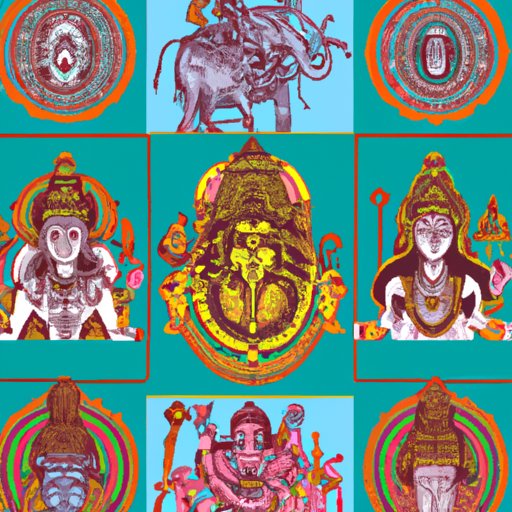Introduction
Hinduism is one of the oldest religions in the world, originating from ancient India. This religion is unique in its belief system, which includes a vast number of gods and goddesses. Understanding the Hindu Pantheon, or the collection of gods in Hinduism, is crucial in understanding Hindu culture and religion as a whole.
The Most Important Gods in Hinduism
When it comes to the Hindu Pantheon, some gods are more significant than others. Here are five of the most important Hindu gods and a brief explanation of their roles and what they represent:
- Brahma: the creator of the universe and the god of creation.
- Vishnu: the preserver of the universe and the god of protection and preservation.
- Shiva: the destroyer of the universe and the god of regeneration, meditation, and spirituality.
- Ganesha: the remover of obstacles and the god of new beginnings.
- Devi: the mother goddess and the representation of feminine energy and power.
These gods are the focus of worship and devotion for millions of Hindus around the world.
The Concept of Monotheism in Hinduism
While the Hindu Pantheon includes many different gods and goddesses, Hinduism is not necessarily polytheistic in nature. Instead, it is often considered henotheistic or even monotheistic.
The concept of monotheism in Hinduism revolves around the idea that there is one, ultimate God known as Brahman, who manifests in different forms or avatars. These different manifestations of Brahman have different names, forms, and personalities.
Comparing the concept of monotheism in Hinduism to other religions, such as Christianity or Islam, may be somewhat challenging. However, the idea of a single, universal God is a common thread that connects all these religions.
The Symbols and Stories of Hindu Gods
Hindu mythology is rich with stories and symbols associated with different gods and goddesses. These stories and symbols help to convey the unique characteristics and personalities of each god.
For instance, Ganesha is often depicted with a large elephant head and a pot-bellied body. The elephant head is said to represent wisdom, while the pot-belly symbolizes prosperity and fertility. Similarly, the story of Shiva and his wife Parvati and their various adventures help to illustrate the god’s qualities of meditation, spirituality, and regeneration.
These stories and symbols play an essential role in Hindu culture, providing a means for believers to connect with the gods and goddesses and understand their place in their own lives and the world at large.
Comparing Hindu Gods With Other Pantheons
Comparing and contrasting the Hindu Pantheon with other pantheons in different religions can be fascinating. In some senses, the Hindu Pantheon is similar to the pantheons of ancient Greece or Rome, both of which featured a vast array of gods and goddesses with different roles and unique personalities.
However, while the gods of ancient Greece and Rome often embodied pure human emotion and impulses, many Hindu gods were revered for their spiritual, transcendent qualities. As such, the Hindu Pantheon is often described as being more complex and nuanced than other pantheons of ancient religions.
The Evolution of Hindu Gods
The gods of Hinduism have evolved over time, reflecting the historical, cultural, and religious factors that influenced the development of Hinduism. For instance, the oldest Vedic gods were often associated with natural elements, such as the sun, the moon, and the earth.
Later, as Hinduism became more prominent and diverse, new gods were added to the Pantheon, reflecting different aspects of human life, such as family, love, and creativity. Some of these newer gods, such as Vishnu and Krishna, are still widely worshipped today, while others have fallen out of favor or been forgotten altogether.
Conclusion
The Hindu Pantheon is vast and complex, featuring hundreds of gods and goddesses with different personalities, roles, and associated symbols. Understanding the Hindu Pantheon is crucial in understanding Hindu culture and religion as a whole. Through examining the most important gods, understanding concepts like monotheism, delving into the stories and symbols, comparing with other pantheons, and exploring their evolution, one can gain great insights into the religion and culture of Hinduism.
